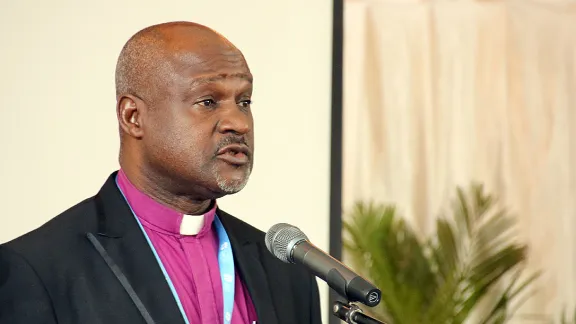
Lutheran Church of Christ in Nigeria Bishop Dr Panti Filibus Musa makes his presentation at the May 2015 consultation and 60th anniversary of African Lutheran church leaders in Moshi, Tanzania. Photo: LWF/Tsion Alemayehu
Nigerian Bishop Musa stresses need for critical reform in theological education, leadership, liturgy and worship
(LWI) – Ongoing renewal of the church must be a priority for African Lutheran church witness, in a context in which progress and abundance exist with struggles for justice, peace, reconciliation and a dignified life.
These were the key messages from speakers at The Lutheran World Federation (LWF) Africa regional consultation and 60th anniversary celebrations, 20-24 May, in Moshi, Tanzania. Over 200 delegates including heads of churches from the 31 LWF member churches, representatives from sister churches around the world, and global LWF leaders reflected on the vision of the first gathering of African Lutherans in Marangu, Tanzania, in 1955. They also analyzed their contribution to the Lutheran communion and the future of the African Lutheran church with a view to the 500th Reformation anniversary in 2017 and beyond.
A presentation by Bishop Dr P. Filibus Musa of the Lutheran Church of Christ in Nigeria (LCCN) summarized the critical issues for the renewal of the African Lutheran church in today’s context. These include theological education, church sustainability, good governance, ecumenism and interfaith relations.
In his paper, “Being a reforming Lutheran church in Africa today,” Musa emphasized that “renewal of the church is not change for the sake of change or fashioning after popular opinions in an attempt to be relevant to modern styles and developments.” Churches, he said, “need to be relevant for the context in which they witness.”
Theological education
Musa, former director of the LWF Department for Mission and Development, called for a more creative approach to theological education, formation, and pastoral training to ensure adequate response to the needs of the church and its mission work. Citing his own country, Nigeria, he expressed deep concern that seminary curricula are loaded with courses designed by their affiliate universities, leaving the church institutions with little time for in-depth work on doctrinal and ministerial courses. “How then do we train pastors to meet up with the yearnings of members and congregations?” he asked.
On the need to reform liturgy and worship, Musa said many Lutheran Christians argue that the liturgy and ancient hymnals still used by churches are very distant from today’s realities. “What is critical in trying to rediscover our worship heritage, however, is keeping in mind that those songs and liturgies were born out of specific realities.”
The LCCN bishop also asked the African churches to critically look at why “we are still struggling under the so-called dependency syndrome and lacking the financial independence to develop much-needed human resources and various ministries.”
Confronting corruption
He decried the general lack of accountability and transparency, and its negative impact on the life and ministry of the church. “If we are serious about renewal, we should boldly name and confront corruption and financial scandals in the church. A reforming Lutheran church in Africa cannot turn deaf ears to widespread rumors on the disappearance of church funds sometimes suspected to be diverted into personal projects, corruption in the form of abuse of power and nepotism in the churches.”
On leadership renewal, he reminded the church representatives of the Christian calling to servanthood leadership. He said it was “indeed sad” that people fight for leadership positions not as a calling to serve, but to fulfill personal ambitions. “We need to understand that Christian communities today increasingly appreciate leaders who live and lead by example.”
Musa noted that despite democratic changes and economic progress since the 1960s, there is growing impoverishment of huge sections of Africa’s population, high unemployment rates especially among the youth, poor social infrastructure and basic services, and extremist-related violence. “We are going through a very sad period, when human life has become so cheap, evident in the senseless killings and destruction of human life across the region. This is a bit of our story within which we reflect on reforming the Lutheran churches in Africa today,” he added.
Other topics discussed at the conference included human beings’ contribution to inequality and ecological destruction; the church’s public responsibility in view of violence against women; and the importance of ecumenical and interfaith encounters in the public space.


